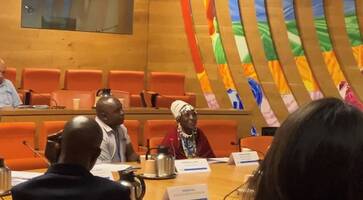Beekeeping creates a buzz at World Forest Week
Keeping bees not only improves livelihoods for Masaai women in Tanzania. It also provides an integrated solution to many of the challenges small-scale farmers face, resulting in healthier forests, enhanced climate resilience and improved food security. Early successes show there is great potential for more growth and development to come.

At a practical demonstration last week at the World Forest Week (WFW), in FAO headquarters in Rome, delegates were lucky enough to meet Maria Shinini – a beekeeper from Esilalei village, Monduli District in northern Tanzania.
In recent years, Masaai women have turned to producing honey from beehives in the forest to generate additional income. This is because drought, caused by climate change, is making it difficult for communities to make a living from keeping cattle. Nothing in the process goes to waste.
At the demonstration, as well as samples of her honey, Maria shared lip balm, soap, skin cream and candles made from beeswax that would previously been discarded.
Beekeping in Tanzania – the story so far
Each year, the beekeeping sector in Tanzania generates an average of US $5.2 million a year from sales of both honey and beeswax products, according to a recent report by Foreign Commonwealth and Development Office (FCDO)’ s Africa Regional Climate and Nature Programme (ARCAN). Around 2 million rural people rely on beekeeping for their livelihood, with great potential to improve families’ incomes.
What’s more, the Tanzanian government has identified beekeeping as a key adaptation strategy for drought-prone areas in its National Climate Change Response Strategy. But although the government is keen to support the honey sector, its capacity is very limited – both in terms of money and skills.
Buzzing with success
From the outset, Maria’s group received vital training from MVIWAARUSHA – Network of Farmers' Groups in Arusha supported by the Forest and Farm Facility (FFF). Through this, the women built skills in entrepreneurship, labelling and processing, and how to control insect pests. They also learned how to combine forces with other beekeepers to access new markets.

Crucially, they became aware of how keeping bees is an important way to promote climate resilience and biodiversity. They know they need to protect the forests which are a habitat for their bees and that this promotes carbon storage (as the trees are left growing longer). In turn, the trees provide shade for the crops below from rising temperatures, and the variety of crops for bees to pollinate supports biodiversity.
Beginning with just five hives, a beekeeping suit and a smoker, Maria’s group now has 73 hives. Business is flourishing – and the forest is coming back. It has also changed Maria’s position in her patriarchal community. Maria is now treasurer of her local beekeepers’ group and persuades other women in the community to get involved.
“Beekeping has changed my life. I can now save money for myself. I have bought five goats which make milk for the family, and I can pay for my children’s education.” said Maria Shinini at the FAO’s demonstration.
A hive of activity
Maria’s story is echoed in other beekeeping communities in northern Tanzania, including Tumatri Apiary in Mbulu district, showcased in the ARCAN report. With FFF support, these groups are now able to make more money from their honey with modern hives that can be cleaned and re-used, and new processing equipment to produce and package better-quality products. They have established local beekeeping associations which share experiences between members, provide shared local storage and processing facilities and marketing, including setting a cooperative price for products so local groups don’t compete with each other.
Reducing poverty and improving food security
And that’s not all. Beekeeping has also led to better well-being through social protection offered as a result of producers being part of beekeeping cooperatives – a topic highlighted at the WFW side event promoting forest-based food security and poverty alleviation at which Maria also spoke.

Hosted by the National Forestry and Grassland administration of China, the National Social Protection Secretariat of Kenya, the Food and Agriculture Organization (FAO), and the FFF, the event highlighted effective policies, practices and measures that can enhance the livelihoods of forest dependent communities. Speakers from China, Ghana, Kenya, Nepal and Tanzania recognized the importance of building national strategies, tested in the field, to support local institutions implement land tenure and poverty alleviation policies.
Delegates heard how expanding social protection systems can reduce the vulnerability of local rural communities by providing income security, access to financial services, increased food security and health care. It also enhances gender equality by making it easier for women to access income-generating activities.
Maria explained how rural women's groups can grow their income by adding value to their products through developing business and entrepreneurial skills, with real-life example from her group in Tanzania.
Towards a sweeter future
Looking to the future, there is tremendous scope to upscale honey product production in Tanzania as outlined in the ARCAN report. At the moment, production is small-scale and sold locally. But there is potential to grow and develop so that honey is exported to the international market.
To do this, production would have to be scaled-up significantly as honey exports are usually in metal drums of 200 litres, whilst Maria’s group currently produces honey in 1 litre bottles. This would also require better access to finance and increased support for business planning.
In addition, Tanzania would need to set up an accredited laboratory to test honey samples and to establish quality standards for honey as, at the moment, samples are sent overseas.
This is just the beginning of a longer journey for Tanzania’s honey sector. The future is promising, but for now, it is clear that the humble honeybee is already transforming lives as well as forest landscapes in the country for the better.
